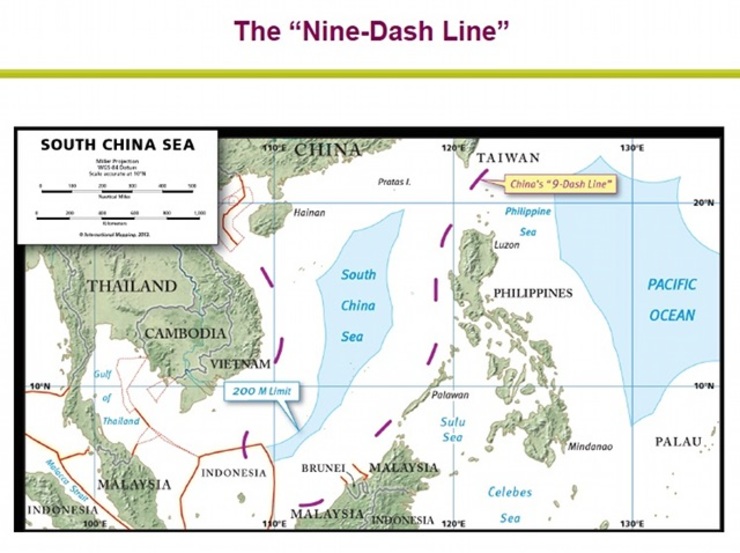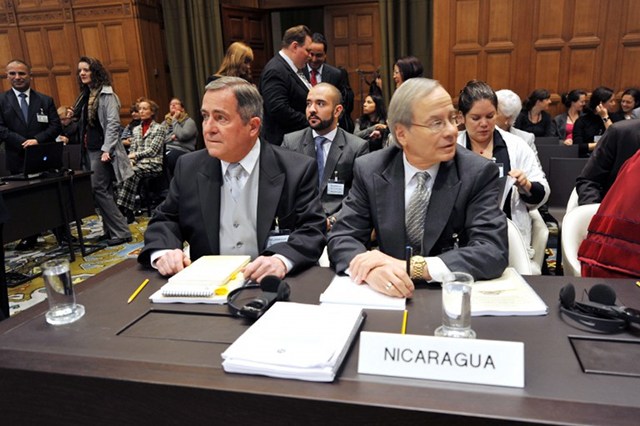The Philippines' legal counsel Paul Reichler tells Rappler China's position paper shows that Beijing felt pressured to show that 'it is not an outlaw nation'

DEMOLISHING ARGUMENTS. Philippine counsel Paul Reichler tells Rappler Manila can 'easily refute' China's arguments detailed in Beijing's position paper. Photo courtesy: Foley Hoag
The Philippines’ lawyer in its historic arbitration case on the South China Sea believes China’s publication of a position paper showed that Beijing “obviously felt pressured” to respond to Manila’s claims.
A renowned international expert on the law of the sea, Reichler was referring to the position paper Beijing released on December 7 detailing its objection to the case. He said its timing a week before the December 15 deadline for China to respond to the Philippines’ 4,000-page pleading was “hardly coincidental.”
“China obviously felt pressured to demonstrate to the international community – and the arbitral tribunal itself, to which China furnished a copy – that it is not an outlaw nation disrespectful of international law,” Reichler said in a statement to Rappler on Friday, December 19. (Read the full statement here.)
“That said, China’s arguments against jurisdiction can easily be refuted by the Philippines.”
China rejects arbitration, saying that The Hague-based tribunal does not have jurisdiction or the power to decide the case. Instead, it opts to argue its case in public, with the position paper being its first exhaustive official response.
In previous lectures, the Washington-based Reichler said that while China does not participate in the case, its global reputation will be at risk if it defies a ruling favorable to the Philippines. He said last year, “There is a price to be paid for branding yourself as an international outlaw.”
Now that China issued its position paper, Manila’s counsel said that the submission “made it easier for both the arbitral tribunal and the Philippines to do their jobs.”
“The arbitral tribunal will now be fully apprised of China's arguments on jurisdiction, instead of having to guess what they might have been. And the Philippines will now have concrete targets to aim at (and demolish) in future written and oral proceedings,” Reichler said.

NO DEFENSE. Paul Reichler says that
Reichler is considered one of the world’s most respected practitioners of public international law, with 25 years of experience specializing in inter-state disputes.
Chambers Global 2010 said that he belongs to a group of elite lawyers with extensive experience litigating before the International Court of Justice in The Hague, and the International Tribunal on the Law of the Sea in Hamburg.
Reichler now heads the so-called “crack international legal team” handling the arbitration case the Philippines initiated in 2013 under the UN Convention on the Law of the Sea (UNCLOS).
It is the first legal case challenging China’s expansive sea claims, primarily the controversial 9-dash line. (READ: Rough seas: Will PH 'lawfare' work vs China?)
Vietnam, Malaysia, Brunei and Taiwan also have claims to the strategic South China Sea. The waters supposedly hold vast deposits of oil and gas, and are a major shipping route for half of the world’s merchant tonnage.

RESPECTED PRACTITIONER. Paul Reichler (right) has extensive experience in arbitration cases including Nicaragua versus Costa Rica, involving the construction of two canals near the two countries’ border. He is photographed before a 2013 hearing at the International Court of Justice in The Hague. File photo by Maude Brulard/AFP
China’s arguments ‘irrelevant, untenable’
Reichler pointed out that China’s position paper did not attempt to defend the legality of the 9-dash line. The lawyer said in past presentations that Beijing’s silence on the issue was telling.
“Even they appear to recognize that what they have claimed cannot be justified under the UNCLOS or international law generally,” Reichler said during a speech at the Center for Strategic and International Studies (CSIS) in Washington DC in July.
In his e-mail to Rappler, Reichler went on to respond to China’s position on jurisdiction but did not provide details.
“China makes three arguments. Two of them – that the tribunal lacks jurisdiction to resolve territorial disputes, or to delimit maritime boundaries – are entirely irrelevant, because the Philippines has not asked the tribunal to resolve territorial disputes or delimit boundaries.”
The Philippines asked the tribunal to declare maritime features in the South China Sea as mere rocks, not islands. Rocks only generate a 12-mile territorial sea under UNCLOS. In contrast, islands generate an exclusive economic zone where a state can explore and exploit resources like fish, oil, and gas.
‘The
China said the essence of the Philippines’ claims is territorial sovereignty, beyond the scope of the treaty. It also argued that the claims concern maritime jurisdiction, an exception it identified when it ratified UNCLOS in 2006.
Another Chinese argument is that the Philippines should not resort to arbitration because it committed to settle the dispute through negotiations. Beijing cited its 1995 agreement with Manila, and the 2002 ASEAN-China Declaration on the Conduct of Parties on the South China Sea.
Reichler said this argument was “legally and factually untenable.”
‘US, Vietnam agree with PH’
Besides China’s legal brief, Reichler also commented on what he called two other significant developments related to the dispute.
He hailed the US State Department’s study questioning the legality of the 9-dash line as “extremely well done.” Reichler said the December 5 paper “makes abundantly clear” that the line is contrary to international law.
“According to the State Department study, China has failed to make out a case for ‘historic rights’ even under pre-Convention customary international law. This is consistent with what the Philippines has argued in the arbitration,” Reichler said.
The counsel added that Vietnam’s submission of a Statement of Interest to the tribunal also supported the Philippines’ case. Hanoi announced last week that it commented on the case, a surprise move seen as a political victory for Manila.
“In stating its own positions, [Vietnam] completely agreed with the Philippines both on the arbitral tribunal's jurisdiction over the Philippines' claims and the merits of those claims,” Reichler said.
The tribunal gave the Philippines until March 15, 2015, and China until June 16, 2015 to submit written comments on the case. Manila expects a ruling by early 2016.
Reichler reiterated that the Philippines will score a legal victory.
“The Philippines is confident the arbitral tribunal will find that it has jurisdiction over the case.”
http://www.rappler.com/nation/78454-paul-reichler-china-paper

No comments:
Post a Comment
Note: Only a member of this blog may post a comment.